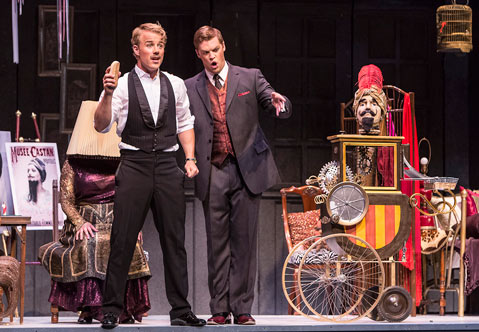The Rake’s Progress at the Granada Theatre
Music Academy Takes On Opera by Stravinsky on Friday, August 3

David Paul’s crisply paced and emotionally intense production of Igor Stravinsky’s bold neoclassical opera The Rake’s Progress reset the action from William Hogarth’s 18th-century London to the same city in the late 1920s and early 1930s. Although such time shifts can be superficial, this decision served the integrity of the original material, as it restored the sincerity of the sentiments expressed in Hogarth’s story without diminishing the multilayered ironies of W. H. Auden’s outrageous and thoroughly modern libretto.
Intellectually, this Rake ranges far, embracing everything from the Faust legend of the Middle Ages to the existentialism of post–World War II French philosophy. With outstanding performances by Adam Fisher as Tom Rakewell and Cameron McPhail as the devilish servant Nick Shadow, as well as a vibrant chorus, the audience at the Granada had much to admire, and even more at which to wonder. Questions of sexual orientation, masquerade, and polymorphous perversity arise so frequently in this opera that they nearly defy interpretation. In Act III, when Rakewell winds up in the insane asylum at Bedlam, it’s hard to imagine an appropriate alternative destination for him, given what he has been through.
On Friday night, the female lead, Anne Trulove, was sung by soprano Jessica Strong, the cover for the part, and she was strong in a very demanding role. Her chemistry with Fisher was apparent from the tenderness of the opening scene, and she handled the critical first-act aria “No Word from Tom” very effectively, achieving unity between her character’s dramatic situation and Stravinsky’s beautiful music.
With a character like Anne Trulove, this production’s sincere approach worked wonders. But what are we to make of the mezzo role Baba the Turk, a comic part for a bearded lady? Kate Allen was funny and spot-on singing the highly unusual role, but this aspect of the story certainly gave one pause. Why would a wealthy young man about town marry the bearded lady, except to create a situation that even a 21st-century audience would find incongruous? Nick Shadow’s very 20th century–sounding bit of sophistry about freedom — the only explanation we have for Rakewell’s odd decision — is purposefully disconcerting, leaving us with nowhere to place our longing for comic resolution but with many memories of funny moments. Congratulations to David Paul and his cast for recognizing the deep strangeness of this work.



